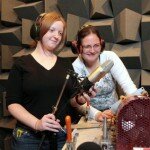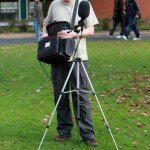Many of us are constantly in possession of technologies allowing us to make recordings, whether that is the sound of our child’s first music concert on a digital camera or capturing a practical joke on a mobile phone. There are many outlets for this user generated content. 72 hours of video are uploaded to YouTube every minute.
 Mainstream news bulletins often use amateur footage of dramatic events and some TV programmes entirely consist of user generated content. The sound quality of such content is often poor: distorted, noisy, with garbled speech or indistinct music. Our interest lies in the causes of poor quality. Typical problems include: speaking off microphone; distorted speech; wind noise and microphone handling noise.
Mainstream news bulletins often use amateur footage of dramatic events and some TV programmes entirely consist of user generated content. The sound quality of such content is often poor: distorted, noisy, with garbled speech or indistinct music. Our interest lies in the causes of poor quality. Typical problems include: speaking off microphone; distorted speech; wind noise and microphone handling noise.

We want to improve recording quality so that user-generated audio can be more widely used. To do this we will develop an understanding of how recording errors are perceived, as it is unclear how noise and distortion affects the perception of audio quality for many sounds. We will also develop algorithms for automatically evaluating quality. This three year EPSRC project commenced in april 2012, and partnered with the University of Salford team, is BBC R&D and The British Library Sound Archive.
If you want to know more about the project, contact Dr Paul Kendrick at
Why is this useful?
Rapid quality assessment could determine whether the sound is of broadcast quality without time consuming manual auditioning.
- An audio quality assessment method would make it possible to tag for content and quality, enabling better archive and audio database navigation.
- Audio quality ratings produced at the time of recording could alert recordists to problems; for example a wind noise warning light.
- A rating of audio quality could be used to produce devices which automatically correct common recording errors.
Although the focus is on user-generated content, professionals can also make poor recordings
How will we do this?
The research is split into five areas:
- Survey of public and industry professionals, to determine the causes of low quality audio.
- Acquisition/generation of a large database of audio examples.
- Perceptual testing to quantify effect of recording errors on quality.
- Lab and large scale online testing methods.
- Machine audition, design and validate blind algorithms to predict the effect of recording errors on the sound quality.
